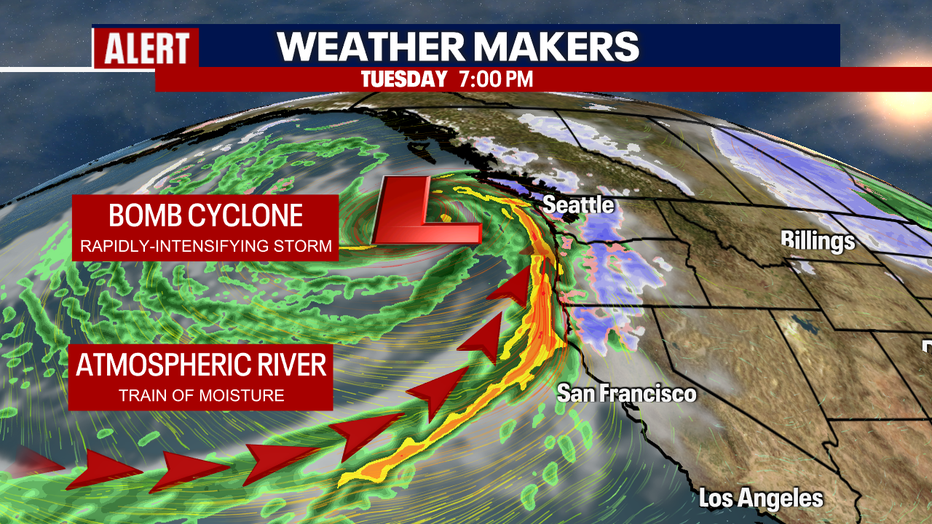The difference between a PNW bomb cyclone and atmospheric river, explained

'Bomb cyclone' to bring strong winds to WA
WA residents are preparing for possible damages as a "bomb cyclone" is expected to bring strong winds.
SEATTLE - While atmospheric rivers and bomb cyclones can bring intense precipitation and strong winds, they are distinct meteorological phenomena with different implications for weather patterns.
Keep reading to learn the differences between a bomb cyclone and an atmospheric river.
What is an atmospheric river?
An atmospheric river is a long, narrow region in the atmosphere that can transport most of the water vapor outside of the tropics, according to the National Oceanic and Atmospheric Administration (NOAA).
These bands of moist air often originate over the warm waters of the Pacific Ocean and can carry an amount of water vapor equivalent to the average flow at the mouth of the Mississippi River. When they make landfall, they can result in significant rainfall and snow, leading to flooding and water supply benefits.
Atmospheric rivers are responsible for up to 50% of the western United States' annual precipitation.

(FOX 13 Seattle)
What is a bomb cyclone?
A "bomb cyclone" is a term for a weather event that comes from the real meteorological term "bombogenesis." It occurs when a mid-latitude cyclone rapidly intensifies.
The central pressure within the cyclone must drop at least 24 millibars (a measure of atmospheric pressure) in 24 hours to qualify as a bomb cyclone, according to the American Meteorological Society.
This rapid decrease in pressure leads to a corresponding increase in the strength of the storm, often accompanied by high winds and heavy precipitation.
What is the difference between an atmospheric river and a bomb cyclone?
Perhaps one of the most significant differences between the two is their formation conditions. Atmospheric rivers require a stable high-pressure system to channel the moist air to the coast, whereas bomb cyclones form around contrasting air masses and are strengthened by the jet stream's dynamism.
The Source: This story includes information from NOAA's official website on atmospheric rivers and the American Meteorological Society's explanation of bomb cyclones.
MORE NEWS FROM FOX SEATTLE
'Belltown Hellcat' faces Renton court again over assault on his mother
Snohomish County homeowners push back against proposed 8% property tax hike
Seattle's Elysian Brewing shutting down Georgetown location
Here's when ski resorts in western WA are planning to open
North Cascades Highway closed for the season
To get the best local news, weather and sports in Seattle for free, sign up for the daily FOX Seattle Newsletter.
Download the free FOX LOCAL app for mobile in the Apple App Store or Google Play Store for live Seattle news, top stories, weather updates and more local and national coverage, plus 24/7 streaming coverage from across the nation.


